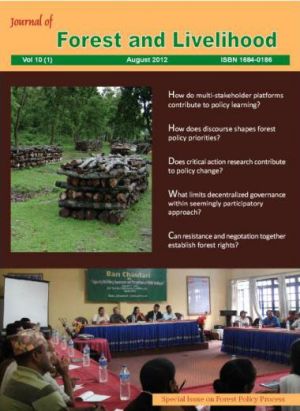Democratising Nepal’s Forest Sector Policy Process: The Role of Resistance by Community Federation
DOI:
https://doi.org/10.3126/jfl.v10i1.8599Keywords:
bureaucratic hegemony, deliberation, policy making, resistance, governanceAbstract
This paper argues that Nepal's existing forest policy process is characterised by nondeliberative and techno-bureaucratic processes despite apparent recognition of the democratic approaches. Analysing two of the government’s recent policy decisions that are related to community forestry and protected areas, we emphasise the complementary role of public contestation, critical research and the media in promoting deliberative policy processes.
Taking reference to deliberative governance perspective, we analyse how multiple factors shape the level of resistance and deliberation around forest policy processes. The key factors that influence deliberation include the institutional history of key actors, the nature, number and interest of actors associated with the process, and the media coverage of a policy issue. Allianceled resistance, policy research and the media mobilisation have been emphasised here to contest inappropriate policy decisions and promote deliberative policy making culture.
DOI: http://dx.doi.org/10.3126/jfl.v10i1.8599
Journal of Forestry and Livelihood Vol.10(1) 2012 28-41
Downloads
Downloads
Published
How to Cite
Issue
Section
License
CC-BY-NC: This license allows reusers to distribute, remix, adapt, and build upon the material in any medium or format for noncommercial purposes only, and only so long as attribution is given to the creator.





